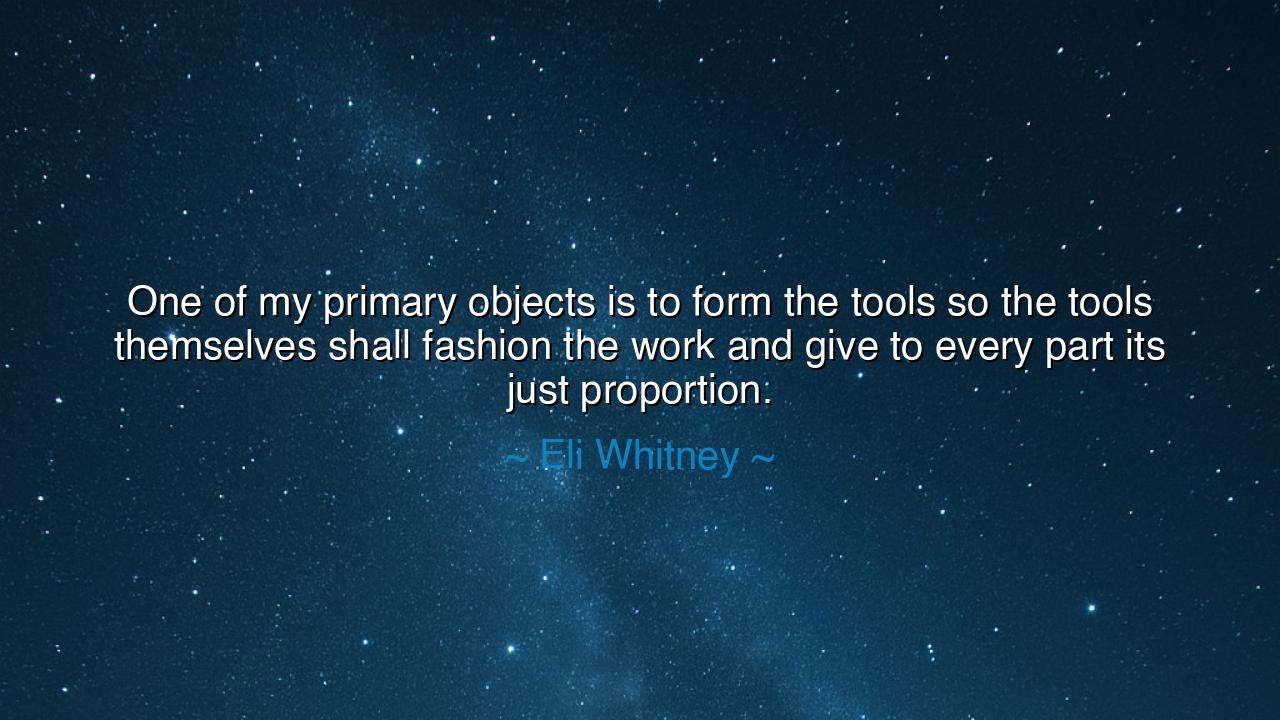
One of my primary objects is to form the tools so the tools
One of my primary objects is to form the tools so the tools themselves shall fashion the work and give to every part its just proportion.






Hear, O children of invention, the words of Eli Whitney, who declared: “One of my primary objects is to form the tools so the tools themselves shall fashion the work and give to every part its just proportion.” These words are not the idle musings of a craftsman, but the proclamation of one who saw far beyond his own hands, into the future of human industry. He speaks of shaping not merely the product, but the very means by which all products may be shaped.
The meaning of this saying lies in the power of innovation and foresight. Whitney understood that the greatest genius is not always in the object completed, but in the creation of the tool that can endlessly reproduce perfection. To form a single work of beauty is admirable; to design the instrument that gives birth to countless works is divine. Thus, he reminds us that the path to greatness is not only through labor, but through designing the very system by which labor may flourish.
The origin of these words lies in Whitney’s own life. Known best for inventing the cotton gin, he was also a master of manufacturing. He pioneered the idea of interchangeable parts, a vision that would transform the art of production. No longer would each musket or machine require a craftsman’s hand for every piece; instead, he sought to create tools and machines that produced uniform parts, each in perfect proportion, so they could be assembled with ease. From this vision sprang the age of mass production, which altered the destiny of nations.
History offers us many mirrors to this truth. Think of Gutenberg, who did not merely copy books, but created the printing press—a tool that multiplied the written word into thousands of voices. Or recall Archimedes, who boasted that with a lever long enough and a place to stand, he could move the world. Each understood what Whitney declared: that the greatest power lies not in the work alone, but in the instrument that makes the work possible, consistent, and enduring.
The lesson for us is radiant: if you would shape the future, do not only labor with your hands—seek to fashion the tools that will carry your labor beyond your lifetime. To make a single harvest is good, but to invent the plow is better. To sing one song is beautiful, but to build the instrument that will sing for generations is nobler still. The wise look beyond the immediate result and into the structures that perpetuate it.
Practical wisdom follows. Whatever your field, ask yourself: What tools can I build? If you are a teacher, craft methods that endure beyond your classroom. If you are a leader, create systems that sustain justice when your hand is gone. If you are an inventor, do not only build the object—shape the instrument that makes the object replicable. In this way, your influence multiplies, echoing far beyond your years.
So let Eli Whitney’s words echo as a beacon: greatness lies in proportion, in designing tools that carry forth balance and harmony. A single work may vanish, but a tool that births a thousand works becomes immortal. Do not be content only to labor; strive to shape the very means of labor, that your vision may ripple through ages.
Thus, O seekers of wisdom, remember: to fashion tools is to fashion destiny. The hand of the craftsman fades, but the tool he leaves behind becomes the hand of the future. And those who build such instruments are not merely workers of their age, but architects of eternity.






NNNhi Nhi
This quote makes me think about how, in many fields, success often comes down to designing effective frameworks. If tools are well-made, the work takes care of itself. Do you think this idea could apply to personal development as well? Could the right habits, mindsets, or routines serve as ‘tools’ that automatically shape our actions and decisions towards greater success?
BNTong Thi Bao Ngan
I love how Eli Whitney’s quote emphasizes the importance of creating the right tools to achieve balance and proportionality in work. It’s almost like the tools themselves become a reflection of the creator’s vision. How do you think this applies to leadership or team management? Can a good leader build a system where the team works efficiently, each contributing their part without needing constant guidance?
PHLe Phuong Hoa
Eli Whitney’s vision of tools having the power to fashion their own work really speaks to the idea of optimizing processes. It makes me think about how much effort we put into refining systems. How often do we overlook the importance of the tools we use? Should we focus more on developing the right tools, systems, and processes to improve the outcomes rather than simply focusing on the outcome itself?
CNchi nguyen
This quote by Eli Whitney is fascinating, especially when you think about its implications for modern technology. If the tools are designed well enough to shape their own work, then the product can be flawless. Do you think this applies to modern industries, where automation and AI are shaping the outcome? How do we ensure that the tools we create today are able to give us the best results without micromanagement?
HHaru
I find Eli Whitney’s perspective quite profound. The idea of designing tools that shape their own work suggests a deep understanding of efficiency and precision. How can we apply this mindset to our own work or life goals? Is it possible to create a ‘tool’ or framework in our personal lives that, once established, continues to improve our work without constant effort?